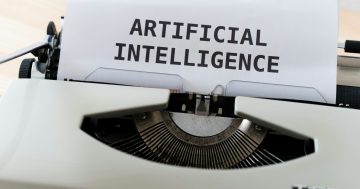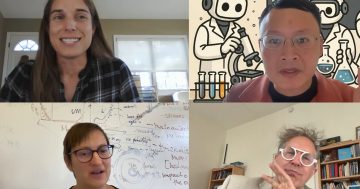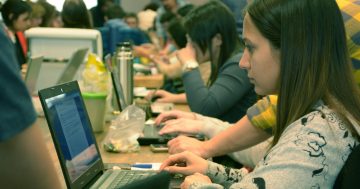
CSU lecturer Travis Holland believes there are pros and cons about the use of AI in entertainment and education. Image: ChatGPT (AI generated).
Communications expert and Charles Sturt University (CSU) lecturer Dr Travis Holland has urged the Australian entertainment industry to “responsibly adapt” to the use of artificial intelligence (AI).
The concerns of AI threatening jobs and creativity in the entertainment industry are at an all-time high following the 118-day actors and writers strike in the United States in 2023.
One of the big talking points about the strikes involved the conditions surrounding film and TV studios using AI to write scripts and replicate actors by scanning faces and using their likenesses for future projects without permission or payment.
Dr Holland said he believed the strikes that took place in Hollywood in the latter half of 2023 would have repercussions around the world, including Australia.
“Governments, impacted industries, and the AI companies themselves need to have an informed and careful discussion about how to responsibly deploy the technology,” he said.
“The SAG-AFTRA [Screen Actors Guild-American Federation of Television and Radio Artists] deals go some way to shaping these discussions, and jurisdictions such as the European Union are starting to implement strong AI regulations.”
Dr Holland said there were two main threats AI brought to creative workers which included its ability to write scripts cheaply.
“Firstly, generative AI can potentially rely solely on historical material to create new scripts,” he said.
“Secondly, in relying on that material, the software seems to breach copyright protections because it is copying and using existing work in ways that were never explicitly permitted by the original author.”
Dr Holland said generative AI could have positive impacts in the entertainment industry, for example, in identifying hotspots for short clips to be shared on social media and transcribing and summarising long interviews.
Aside from the entertainment industry, Dr Holland said there had been conversations about the use of students using AI in a work environment.
“In the case of media or communication students, this might mean producing podcast scripts or ad campaigns for real clients,” he said.
“However, that has some problems. Not only do we largely already do authentic assessments here at Charles Sturt, but the AI tools have no less trouble producing a podcast script than they do an essay.
“Additionally, some industries are already widely adopting generative AI, so suggesting that we should just outright ban it at university would actually go against industry practice.”












